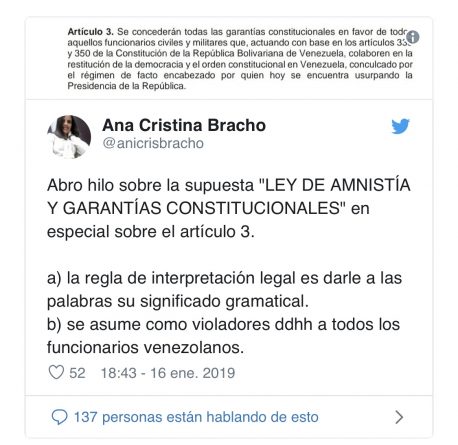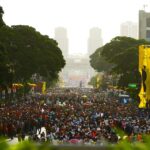The National Assembly (AN) in contempt, after spending two years deeply in the dark, has appeared on the scene with desires to serve as a lever to open the door to scenarios never before imagined. Thus, hidden in a rhetoric that it sustains is based on the Constitution of the Bolivarian Republic of Venezuela, it pushes interpretations contrary to the fundamental principles of the norm and to the most sacred values of our national history.
Can Venezuela stop being a Republic? Can we make our luck an appendage of another country or play on the keys that led to the destruction of Syria? Nothing can cause us more horror or resemble more what is happening.
We have carefully followed the events that have taken place since the beginning of this year 2019, when it was appropriate for President Nicolás Maduro Moros, once elected in May 2018, to be sworn in before the National Assembly. Thus we saw how this entity continues in contempt and also how, in the people of its new Board of Directors, it warned that they would not receive the President-elect.
From the legal point of view, it is necessary to analyze the route of the National Assembly towards a so-called transition.
Four documents dictated and published on January 15, 2019, as well as a norm understood as “Framework law of the transition” of the same, which is not available on the web portal of the National Assembly, are of particular concern.
Read as a whole, they reveal that the National Assembly deepens in the denial of the existence of the Judicial Power and assumes the functions of judging, declaring nullities and establishing the consequences of the factual situations that occur, in their opinion, in the country; repeals the constitutional content, since it considers that what can not be called the law to be so and what is not published in the Official Gazette, and eliminates the notion of the sovereignty of its acts by stating that it acts by support and intention that their actions have effects outside and not within the country.
In this sense, we are facing a set of instruments with more severe consequences than the infamous Carmona Decree that, dismissing public authorities, did not play with the allocation of public powers, nor modified the political system, nor created institutions that do not exist in the current nor in any of the previous Constitutions that Venezuela has had.
The Constitution of the Republic does not foresee any assumption of power vacuum, and that in case of absolute faults it designs a scheme in which, collaborating the powers, the continuity of the Republic is given. Also, that there is no possibility of the Legislative Power to become the Executive Power, much less the Judiciary, and this is not a new clause but the content of the doctrine of the separation of powers.
The question then arises: what happens if a person inside the country does not know the Constitution, endangers national sovereignty, ignores and orders to ignore the authorities of the public sector and summons the military to acts of insubordination, after remembering that the First beneficiaries of this action would be all those military who are in conflict with the criminal law by virtue of having performed some of these acts in the past?
In that sense, a basic definition of a coup d’etat will lead us to understand it as the substitution of existing authorities and the change of command of state institutions by the imposition of a factual power, and although in the past this assumption used to occur through the rise of the military sectors or the performance of insurgent forces, in the present Latin America has seen a tendency to occur with parliaments or judges as new protagonists.
When reflecting on this, it is important that we consider that in recent years we have been challenging a continued coup d’état, to which the national authorities have referred, and if we start from this we are only facing an acceleration of this situation. As well as to observe what are the mechanisms of containment that are going to be applied as the facts arise.

Reading together the documents should warn a desire to criminalize Chavism, both the one that is grouped in the militancy and that without doing so is part of the civil service, because this refers to the “Amnesty Law” promising legal incentives in case to join the bet of the National Assembly.
Similarly, it suggests that the opposition knows of an important heritage that has been accumulating in the time that the Republic has been deprived of using it during this time, and can grow if the foreign sectors grant it control over the same to this subject who wants to break into politics.
There are still some doubts. For the documents are characterized by selecting legal forms not suitable for drafting, to the point that one can speculate believing that there is a protection that parliamentarians take when doing formally null acts, or that someone writes them without knowing Venezuelan law. I guess the future will clarify these points.
Another aspect that is not clearly defined is who is the subject that wants to appear and what is the time lapse that aims to last. For the transition neither begins nor ends in those documents; the signature stamped on the digital versions is only that of the directive; to the press they declare that it is the National Assembly as institution that assumes the situation, and in the “laws” it says that the President of the National Assembly will take the decisions.
It becomes fundamental, finally, not to take as a folkloric fact that they ask in these texts to communicate to the International Community what they are doing, since it seems that they are dictated only to have an effect outside, which also can not be legally way to explain itself if it is not evidencing that it is, in short, the delivery of the country is what they crave.
Translated by JRE/AR
| Website




